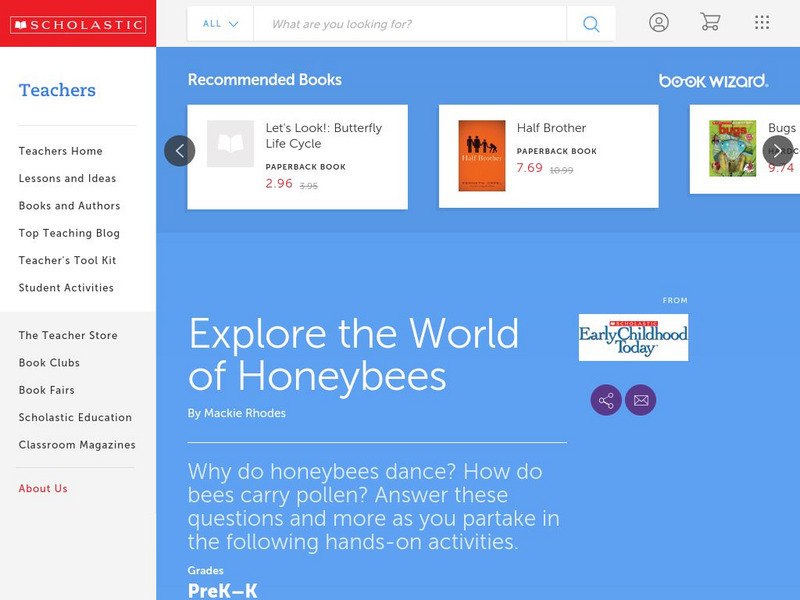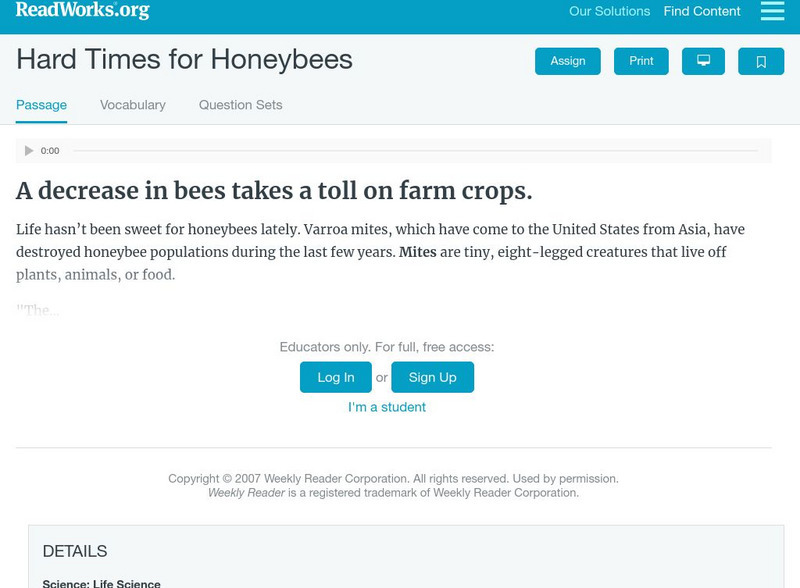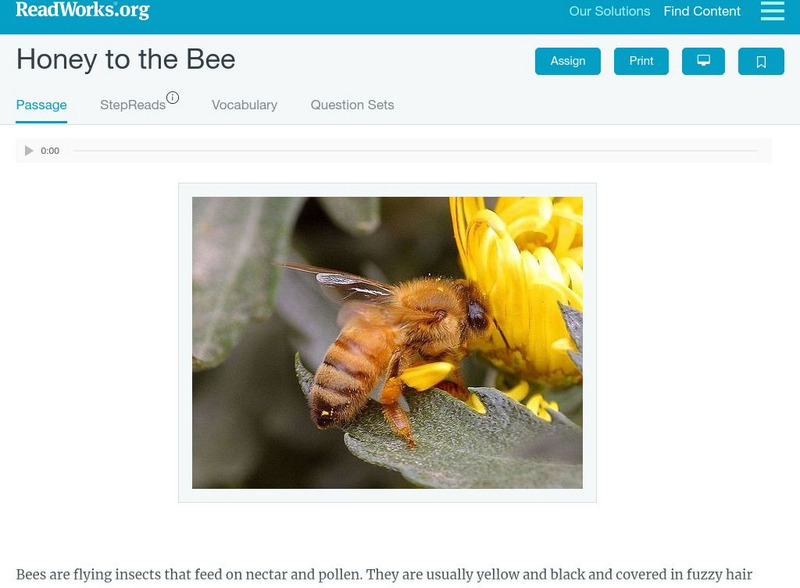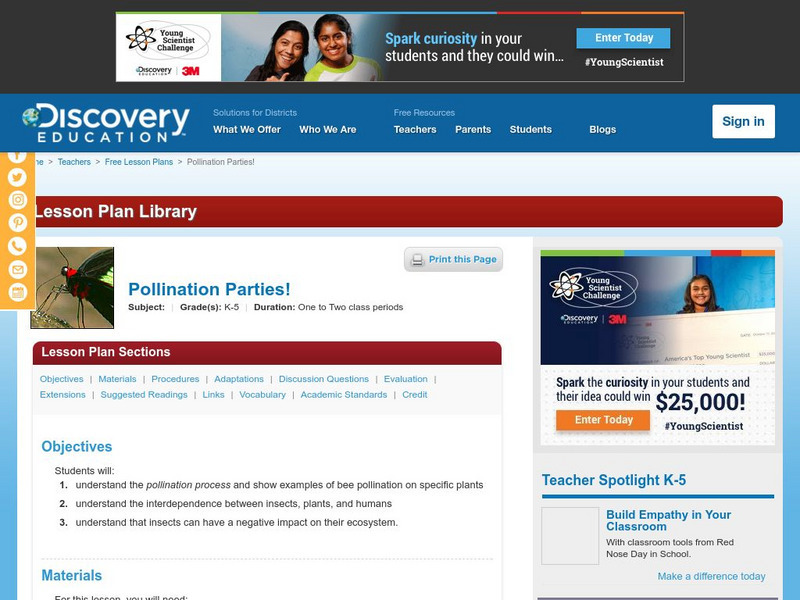Scholastic
Scholastic Instructor: Explore the World of Honeybees
Discover more about bees through this educational resource. This resource features math and science activities, experiments, fun facts, and more.
Read Works
Read Works: Hard Times for Honeybees
[Free Registration/Login Required] An informational text that asks the reader to make predictions about problems created by the decreasing bee population. A question sheet is available to help students build skills in reading comprehension.
Illustrative Mathematics
Illustrative Mathematics: G Mg Hexagonal Pattern of Beehives
Beehives are made of walls, each of the same size, enclosing small hexagonal cells where honey and pollen are stored and bees are raised. This problem examines some of the mathematical advantages of the hexagonal tiling in a beehive....
Read Works
Read Works: Honey to the Bee
[Free Registration/Login Required] An informational text about honeybees. A question sheet is available to help students build skills in reading comprehension.
NC State University
Beekeeping Insect Note: Cucumber Pollination
How many bees do you need to pollinate cucumbers? How do you maintain the hives? Answers to these questions and more.
TED Talks
Ted: Ted Ed: The Case of the Vanishing Honeybees
A lesson investigating the decreasing population of the US honeybee population. There is a video that explores possible causes and the effect this decrease has on our environment. After the video, the students can test their knowledge...
Michigan Reach Out
Newton's Apple: Why Do Bees Sting?
Lesson plan that explains why bees sting, how bee societies are organized and an activity for students to learn how bees communicate using pheromones.
Discovery Education
Discovery Education: Pollination Parties
This lesson helps students understand the concept of pollination. Objectives, materials, procedures, adaptations, discussion questions, evaluation, extensions, suggested readings, links, vocabulary, and academic standards are all included!
Science Education Resource Center at Carleton College
Serc: Investigating Honeybees: Using a Quiz to Access Prior Knowledge
Using Dadant's Honeybee Study Prints, learners learn about honeybee anatomy, reproduction, and behavior.
National Audubon Society
National Audubon Society: Audubon Adventures: The Pollination Story
A colorful, interactive chart illustrating the stages in the pollination of flowers by bees.
Read Works
Read Works: Bug Power
[Free Registration/Login Required] This passage focuses on social insects: honey bees, ants, and termites. A comprehension question set and vocabulary are provided.
Other
Insectclopedia: Lesson Plans
A very comprehensive site from pedagonet.com that includes lesson plans on insects for all ages and grade levels. Learners will enjoy learning about insects as you employ these engaging lesson plans in your own classroom.
Other
Ms. Inselberger's Ap Bio Blog: Why Evolution Is True
In Mr. Coyne's discussion of natural selection, he also illustrates the idea of "adaptive behavior". In full detail, he describes the Asian Giant hornet and all of its physical attributes with which it brutally devours the introduced...
BiologyWise
Biology Wise: Emergent Properties That Exist in Biology
An explanation of the concept of emergence and what it means in biology. Emergence is a property of a system or structure that is present in the whole but not in its individual components. Presents examples of emergence at different...
Other
Maarec: The Colony and Its Organization
Find out about the group behavior of bees in a colony.
Other
Pesticide Action Network: Environmental Impacts
An environmental action agency provides information on events that demonstrate how pesticides may wreak havoc on the environment and threaten the food web for years. Examples of effects on honeybees, bats, and frogs are provided.
Cayuse Canyon
The Us50: Georgia
This site provides excellent information regarding Georgia's history, geography, state parks, and historic sites. A fact sheet of information and a quiz is also available.
Other
Dennis Kunkel Microscopy: Most Wanted Bugs
Sneak a peek at the mug shots of some popular bugs.
BiologyWise
Biology Wise: Understanding Batesian Mimicry
Biological mimicry is a fascinating subject and Batesian mimicry does not disappoint. It occurs as a protective mechanism when one defenseless species mimics characteristics of a species that can harm or even poison a predator. Examples...
Curated OER
Honey Bees
This colorful site not only provides images of some common insects, but includes information on the foods which they eat as well as the habitats where they can be found.
Other
American Academy of Allergy, Asthma & Immunology: Stinging Insect Matching Game
Learn to recognize the difference between the different kinds of stinging insects in this matching game.
University of Kentucky
University of Kentucky: Bug Fun
This fun site is designed for teachers who want to have interactive fun in the classroom. "Several articles give resources and basic information about insects and their relatives while others outline activities with different insect...
Other popular searches
- Africanized Honey Bees
- Math and Honey Bees
- Honeybee Life Cycle
- Science Honey Bees
- Americanized Honey Bees
- European Honey Bees
- Honey Bees Communication
- Honey Bees and Ants
- Honeybee Anatomy
- Honey Bees Pollination
- Over Wintering Honey Bees
- Pictures of a Honeybee

















